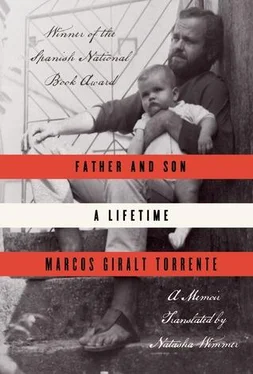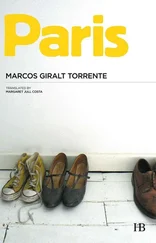I say goodbye to my father at the airport on November 29, and over the next ten days I visit the notary to sign the contract for the sale of the house, I deposit the check in a joint account, I rent a safe-deposit box for the payment in cash, I pack his clothes; I select — from the scant furnishings that survived the depredations of the friend he met in Brazil — what to bring to the pseudo-duplex that will be our home for the next three months; I perform the move … Meanwhile, my father takes walks with my mother, partially recovers his lost appetite, and, most of all, delights in the house in Galicia, which he can’t praise enough. I feel as if his approval is my final exam, passed with flying colors. I feel, just as I did when he saw it for the first time, that nothing my mother and I have ever done redeems us so thoroughly, that only our years of relentless saving make us deserving of the trust we were previously denied. I feel that if the house didn’t exist, he might not have put himself in my hands as he’s done. Later, my mother tells me that the days he spends at the house are an occasion for confidences, too. Apparently, he’s more open with her than he’s been with me, and he tells her that the only thing that consoles him is the thought that he has something to leave me. Apparently, at some point when my mother was telling him that she still hadn’t forgiven her own father for having favored his second wife and her children in his will, my father defended my grandfather’s memory, explaining that he probably acted as he did out of weakness and that he himself would have left everything to the friend he met in Brazil if she had taken care of him as she ought. I’m touched by this noble gesture, my father dragging himself through the mud to heal my mother’s wound with his own.
But around this time, December by now, I know from his diary that my father is conscious that the end is nearing. His body doesn’t respond the way it used to. He’s permanently tired. Everything scares him. Everything is a great effort, and the only thing that makes it worthwhile is the affection he feels surrounding him. Just a few weeks ago, difficulties were surmountable because of his will to live. Now, having lost the will, or having come around to the idea that sooner or later his will won’t be enough, the only thing that seems to keep him going is his desire not to let others down. Not to let me down, especially. And also, perhaps, his wish to make the most of his time with me, to repay me with this final burst of devotion for everything that we didn’t give each other in the past.
He’s exhausted when he gets back from Galicia. He won’t let anyone meet him at the airport. He takes a taxi to the unfamiliar place where my wife and I are waiting for him and where, though it’s only a temporary destination, I’ve tried to arrange some objects that have always accompanied him: the dresser from his bedroom, a carriage from an electric train he had when he was a boy.
The following days, December days, I lead an exhausting double life. On the one hand, I have to care for him with renewed vigor; on the other, I have to handle matters that could wait but that I need to proceed with to give him the impression that life is going on. I have to supervise the renovation of my mother’s old apartment where we’re supposedly going to live; I have to start work on the studio where I keep telling him that he’ll be able to paint; I have to find a lawyer to set in motion his divorce from the friend he met in Brazil, as he’s asked me to do. While I crisscross the city, he scarcely leaves the house, and when he does, I’m almost always at his side. Few are the days when this isn’t the case. One afternoon he goes with friends of his, a couple, to a Howard Hodgkin show, and he’s so pleased when he gets back that I’m sorry to have missed the chance to once again share the satisfaction he gets from looking at art.
It’s rare for him to forget, to come out of himself.
And not because he doesn’t try, because he does. He tries to be attentive, he tries to please; he’s immediately sorry if his perpetual tenseness (his feet hooked around the extendable footrest of the recliner) makes him snap at someone.
And he makes jokes.
But the day is long and full of hours, and it’s hard to turn his waning attention from the television screen. He keeps doing the crossword puzzle from the newspaper, and each day he writes a sentence or two in his diary, but he hardly reads, he can’t concentrate. It isn’t easy to engage him in conversation, unless it has to do with the progress of the renovation work, about which he’s always inquiring. When I’m alone with him, if I ask him about something concrete, he makes an effort not to disappoint me, but he rarely takes the initiative. When he has visitors, his gratitude and happiness gradually fade, and if several people are talking, he eventually falls silent. He has to be asked a question, addressed directly, to be prevented from drawing into himself.
But there are days that are exceptions; moments, especially. In general, his fitful interest in talking is revived by memories that give him the chance to vindicate himself or by subjects so foreign that they manage to distract him. He also has more of a tendency to let loose when the conversation touches — however tangentially — on subjects from which he thinks I can derive some lesson. He complains, as I’ve said, about not having painted enough, about having wasted time chasing women. To hear him talk, it might seem as if he’s weighed down by a sense of guilt and moral failing that he needs to purge, but the truth is that, beyond any tendency toward exhibitionism and vanity, the invocation of his sexual appetite and his need for women actually seems to be the most immediately accessible way to warn me about dissipation, about all those dead-end temptations whose constant pursuit may be, at the end of the day, an excuse for neglecting anything more arduous, time-consuming, or uncertain. Love itself, work, the construction of a living fortress that, by protecting us from the unexpected, allows us to pursue our calling in peace. He doesn’t say as much, but what he’s warning me against is the sloth of discouragement. What he laments is having shown himself to be vulnerable to setbacks, having allowed himself to be seduced by flight when his work required perseverance.
A couple of times, though in words distorted by an emotion whose source I no longer recall, he goes so far as to say something to me that until only recently was completely unthinkable: I should have stayed with my family. Both times I realize that the ambiguity of the noun makes it impossible to say whether he’s including my mother or gently excluding her, and I — familiar with mounting waves of feeling dominated by the irrational, and even having come to empathize with the reasons that may have led him to distance himself (ranging from the egoism of someone who would rather seek refuge by himself than risk a shared exposure to the elements, to the tortuous logic of the person who, believing himself to be a burden, prefers not to get in the way of those who will advance faster without him), which I understand not just in an intellectual or abstract way, but through my own experience of the anguish, chaos, and loneliness from which one and the other spring, so that what I’d like to tell him is I understand you perfectly —must nevertheless accept that my immediate rejection of his piteous assertion, I should have stayed with my family , be taken as a formal statement of compassion.
I also have words of praise for his work, and I tell him, with conviction, that others would declare themselves satisfied if they had accomplished as much.
But nothing helps.
It seems it isn’t always a good thing to make him talk.
Читать дальше












